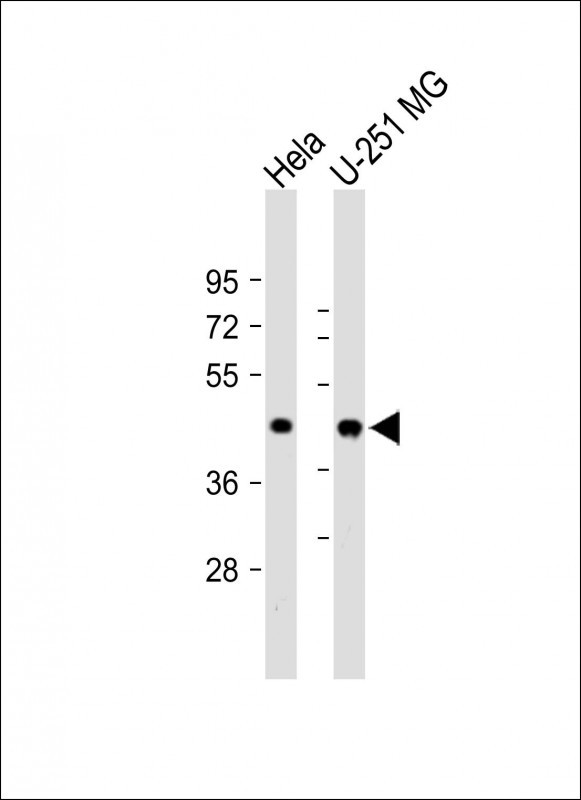
| WB | 咨询技术 | Human,Mouse,Rat |
| IF | 咨询技术 | Human,Mouse,Rat |
| IHC | 咨询技术 | Human,Mouse,Rat |
| ICC | 技术咨询 | Human,Mouse,Rat |
| FCM | 咨询技术 | Human,Mouse,Rat |
| Elisa | 咨询技术 | Human,Mouse,Rat |
| Aliases | Free fatty acid receptor 2, G-protein coupled receptor 43, FFAR2, FFA2, GPCR43, GPR43 |
| Entrez GeneID | 2867 |
| WB Predicted band size | 37.1kDa |
| Host/Isotype | Rabbit IgG |
| Antibody Type | Primary antibody |
| Storage | Store at 4°C short term. Aliquot and store at -20°C long term. Avoid freeze/thaw cycles. |
| Species Reactivity | Human |
| Immunogen | This FFAR2 antibody is generated from rabbits immunized with a KLH conjugated synthetic peptide between 286-315 amino acids from the C-terminal region of human FFAR2. |
| Formulation | Purified antibody in PBS with 0.05% sodium azide. |
+ +
以下是关于FFAR2抗体的3篇参考文献,按文献名称、作者和摘要内容简要概括:
---
1. **文献名称**:*FFAR2-dependent adipose tissue macrophage regulatory function in diet-induced obesity*
**作者**:Kimura I, et al.
**摘要**:该研究利用FFAR2特异性抗体,揭示脂肪组织巨噬细胞中FFAR2通过响应短链脂肪酸(SCFAs)调控炎症反应,并改善高脂饮食诱导的胰岛素抵抗。抗体用于检测FFAR2在巨噬细胞亚群中的表达差异。
---
2. **文献名称**:*Short-chain fatty acids stimulate GPR43/FFAR2 promoting neutrophil chemotaxis via mTOR-S6K signaling*
**作者**:Vinolo MAR, et al.
**摘要**:研究通过阻断FFAR2抗体证实,短链脂肪酸激活的中性粒细胞趋化依赖于FFAR2-mTOR通路。抗体在此用于抑制受体功能,阐明FFAR2在免疫细胞迁移中的关键作用。
---
3. **文献名称**:*FFAR2 modulates gut microbiota composition and mediates fiber-induced protection against colitis*
**作者**:Maslowski KM, et al.
**摘要**:利用FFAR2抗体进行肠道组织免疫荧光染色,发现膳食纤维通过FFAR2调节肠道菌群平衡,减轻结肠炎症状。研究强调了FFAR2作为菌群-宿主互作的核心靶点。
---
**注**:以上文献为示例,实际引用时需根据具体研究补充完整信息(期刊、年份、卷号等)。建议通过PubMed或Web of Science以“FFAR2 antibody”及“GPR43 function”为关键词检索最新论文。
FFAR2 (Free Fatty Acid Receptor 2), also known as GPR43. is a G protein-coupled receptor that binds short-chain fatty acids (SCFAs) like acetate, propionate, and butyrate. These SCFAs are primarily produced by gut microbiota through dietary fiber fermentation, linking FFAR2 to metabolic and immune regulation, particularly in the intestinal environment. FFAR2 is expressed in immune cells (e.g., neutrophils, macrophages), adipocytes, and enteroendocrine cells, where it modulates inflammation, insulin sensitivity, and energy homeostasis.
FFAR2 antibodies are critical tools for studying its expression, localization, and function. They enable detection of FFAR2 in tissues or cells via techniques like Western blot, immunohistochemistry, and flow cytometry. Researchers use these antibodies to explore FFAR2's role in diseases such as inflammatory bowel disease (IBD), obesity, diabetes, and metabolic syndrome. For instance, FFAR2 activation by SCFAs may suppress excessive inflammation in IBD or influence adipocyte differentiation.
Antibodies targeting FFAR2 are often validated using knockout controls to ensure specificity, given the receptor's structural similarity to other GPCRs. Both monoclonal and polyclonal variants exist, with applications tailored to experimental needs. Challenges include distinguishing FFAR2 from its close homolog FFAR3 (GPR41) and accounting for tissue-specific splice variants. Overall, FFAR2 antibodies are pivotal in elucidating gut-microbiota-host interactions and developing therapeutic strategies targeting metabolic or immune disorders.
×